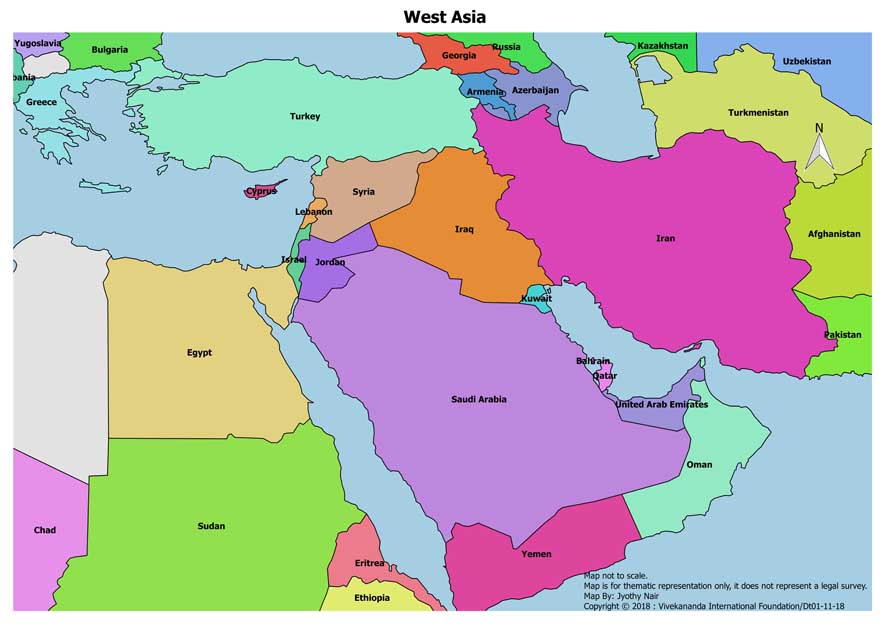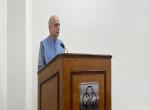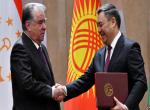West Asia continued to be fraught with conflicts, competition and crisis with newer challenges springing up with the decision of US to withdraw its troops from Syria, and Iraq leaving the field wide open for Russia and regional competing powers i.e. Saudi Arabia, Iran and Israel. Some progress on the Yemen reconciliation is on the cards but it is too early to call a truce for a decisive peaceful outcome.
Syria
On December 19, President Trump, in keeping with his flamboyant style and diplomacy, announced the withdrawal of US Troops from Syria resulting in return of about 2000 soldiers and officers back to the US. He stated that it was in keeping with his announced policies for not fighting others’ wars and putting the Americans in jeopardy. The US Troops are located in North West Syria and are working closely with the Syrian Kurds there which was a major bone of contention with the Turkish establishment. The sudden decision apparently without any discussion or preparations surprised his own Administration and officials who until recently have been claiming and assuring that the American presence and protection for the Syrian Kurds will continue, and who have once again been left at the mercy of the Turkish or the Syrian onslaught. This also resulted in the resignation of Defence Secretary Mattis who did not agree with the decision since all the Trump’s security officials felt that the US military presence in Syria was essential to counter the Russian and Iranian influence in the region. Earlier in the week, President Erdogan had a telephone call with President Trump in which he assured the latter that the Turkish forces will eliminate the remaining ISIS hideouts wherever present in Syria.
This has given the Russians and Iranians a comparative advantage, even though as an afterthought the immediate withdrawal of US troops is being re-calibrated. Russians were cautious about their reaction to the US announcement as they would like to continue their military, diplomatic and intelligence cooperation with the US in so far as Syria is concerned. The Iranians were far too overt stating that “from the start, the entry and presence of American forces in the region has been a mistake and a main cause of instability and insecurity”, although they do not believe that the American containment of their regional ambitions would become any less. While Saudi Arabia has been asked to fork out US $ 250 billion for the reconstruction of Syria, the Iranians will also like to take the major share of the reconstruction pie. The Gulf Cooperation Council (GCC) countries have actively begun to engage President Assad and the UAE has already declared its intention to open its embassy in Damascus. Hence one could see a greater competition between major GCC countries like Saudi Arabia and UAE on the one side and Iran on the other while Assad is expected to play his cards very adroitly.
Meanwhile, Tamir Hayman the Chief of Israeli military intelligence spoke at a conference in Tel Aviv stating that 2019 would bring significant changes to Syria, and Israel was monitoring the Iranian presence stressing that with the return of stability to Syria under the umbrella of Russia, Iran could use its growing influence in Iraq to turn into a launching arena for attacks against Israel. It was also reported that the Israeli army fears the possibility of serious military escalation on all fronts of combat, from Syria to Lebanon and even the Gaza Strip and perhaps the West Bank in 2019.
Libya
The ISIS presence and attacks continued in the war torn Libya with the attack on their foreign office building in Tripoli. While the efforts are continuing to bring about competing governments from the east and west of the country to the table so that new elections could be held, an initiative to unite Libya’s security agencies was reported between the rival governments in Tripoli and Tobruk. A meeting was held in Benghazi between head of the security in Tripoli, Salem Qarimida and his counterpart Adel al-Arfi in Benghazi to discuss current and accumulating challenges. A proposal to unite security efforts and to form a joint committee led by Qarimida was laid out to restore calm throughout Libya. The security crisis in Libya is the most important cause of instability in the country.
Saudi Arabia
In the backdrop of bad publicity and berating of Crown Prince Mohamed Bin-Salman (MBS) in the Khashoggi murder case, the changes in the political setup of Saudi Arabia were expected. On December 27, King Salman announced the significant changes in the Political and Security Affairs Council which is chaired by the MBS. The erstwhile powerful Finance Minister Ibrahim Al-Assaf was made the Foreign Minister while the current Foreign Minister Adel Al-Jubair was demoted to a minister of state for foreign affairs. This was apparently as a consequence to the adverse publicity that the Kingdom and MBS had received in recent times. Another important assignment was given to Musaid Al-Aiban as the National Security Adviser who hitherto has been a royal court official. Similarly, Prince Abdullah bin-Bandar, a cousin of MBS has replaced the Minister of Saudi Arabian National guard which is the major military force of the Kingdom. The economic port-folios remain the same. While much of the maligning of MBS has subsided despite the US establishment being divided in their verdict on him, his position at home in the short term might be strengthened with these cabinet changes.
Israel
As a result of continuing political problems next elections were announced which will be held in April 2019. Elections will be held on April 9, as announced on December 24, by speaker of the Knesset, Yuli-Yoel Edelstein, nearly 8 months before they were originally scheduled. The call for early elections were dismissed as a “historic mistake’ by Netanyahu. However, he eventually yielded. Given the corruption charges and other scandals as well as differences with his right wing political alliance and its fragmentation, current Prime Minister Netanyahu will face a major challenge in returning to power for his 5th run.
Qatar
Qatar decided to leave the 15 member Organization of Petroleum Exporting Countries (OPEC) citing reasons that the OPEC policies do not benefit the country and that it will focus more on enhancing the gas production which is its real strength. It was also seen as the outcome of the continuing spat and blockade between Qatar on one side and Saudi Arabia, UAE and Bahrain on the other. Given the extensive mistrust, the Emir of Qatar did not participate at the GCC summit even though he was personally invited by King Salman of Saudi Arabia – the host of the Summit. A delegation led by Qatar’s minister of state for foreign affairs represented the country at the Summit. Fear have risen that Qatar may even leave the GCC and certain new alliances might come up which was also indicated by Qatar’s Foreign Minister at the Doha Forum. Despite the US pressure and the Kuwaiti efforts, the ensuing conflict and crisis in the GCC is unlikely to end soon and threatens to undermine the GCC itself .











Post new comment